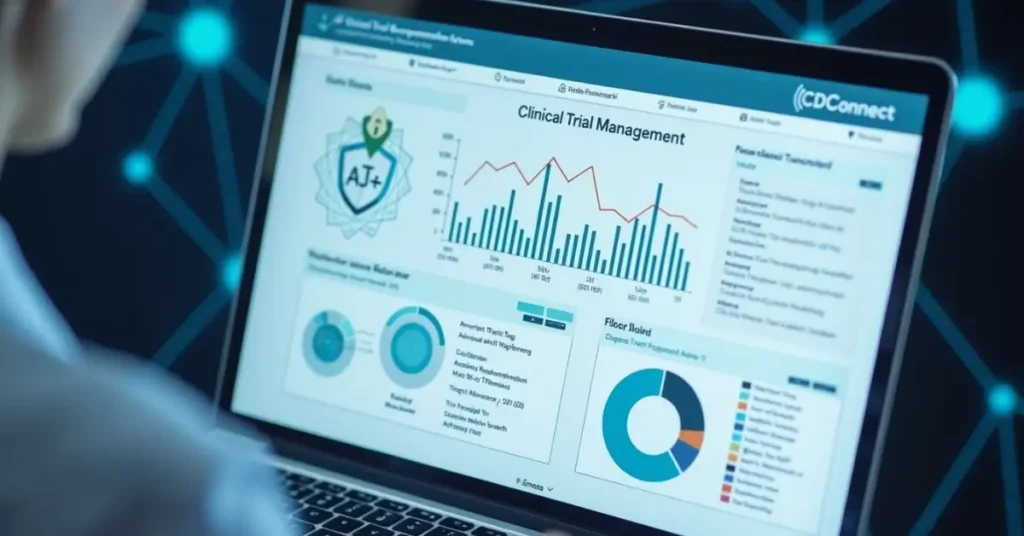
In this article:
- What Is Clinical Trial Data Security?
- How Data Security Protects Participant Privacy
- Security Measures for Protecting Data Privacy and Integrity
- Best Practices for Managing Clinical Trial Data Security
- What to Look for in a Secure Clinical Data Platform
- Supporting Secure Workflows Without Slowing Teams Down
- Final Thoughts on Securing Clinical Trial Data
- Frequently Asked Questions
As clinical trials continue to shift outside traditional research sites, the way data is handled has changed. Remote devices, cloud-based tools, and home-based monitoring have made it easier to gather information, but also harder to keep it safe. Sensitive patient data now flows through more systems and more hands than ever before.
At the same time, strict rules like HIPAA and the General Data Protection Regulation (GDPR) are raising the bar for how organizations manage data privacy and security. This makes strong protections not just ideal, but necessary.
In this article, we’ll explore what data security means in modern clinical research, how it protects both participants and research outcomes, the risks of weak systems, and the best practices for staying compliant and secure, especially when choosing a platform to support decentralized trials.
What Is Clinical Trial Data Security?
Clinical trial data security refers to the systems, rules, and tools used to protect health data collected during a study. These protections ensure that patient data is not exposed, changed, or lost. In a decentralized model, where information is often gathered outside of research sites, strong security measures are even more critical.
Data security involves both technical safeguards and transparent processes that work together to prevent problems. These systems help meet regulatory demands and reduce the risk of errors, leaks, or misuse. A strong security setup also builds trust with participants and helps teams run trials more smoothly.
Understanding Data Security in the Clinical Research Context
In clinical research, data security is the practice of keeping all trial data safe from unauthorized access, leaks, or corruption. It applies to everything from the first stage of data collection to final analysis.
Key Components of Clinical Data Security:
- Data Encryption: Ensuring all data is encrypted both at rest and during transmission to prevent unauthorized access.
- Access Controls: Implementing role-based permissions to restrict access to sensitive records, allowing only authorized personnel to view or modify data.
- Secure Storage and Transmission: Utilizing secure platforms and protocols to store and transmit clinical data reliably and safely.
- Regulatory Compliance: Adhering to established data protection standards and frameworks, including HIPAA 1 (Health Insurance Portability and Accountability Act), GDPR 2 (General Data Protection Regulation), and ICH-GCP 3 (International Council for Harmonisation – Good Clinical Practice).
While data privacy focuses on participant rights and informed consent, data security focuses on protecting information. Both are key to data management in clinical research, and neither should be overlooked.
How Data Security Protects Participant Privacy
Protecting privacy goes beyond simply hiding names or masking records. In clinical trials, privacy means creating a space where people feel safe sharing sensitive health information. Strong data security is what makes that possible. When systems are secure, participants are more likely to join and stay in a study because they trust that their personal data is being handled responsibly.
Why Patient Privacy Is Foundational to Clinical Trial Participation
Privacy is often the deciding factor for whether someone joins a clinical trial. When researchers clearly protect privacy and data, they build trust. That trust improves recruitment and long-term engagement.
Explicit protections also support compliance with legal frameworks like HIPAA and GDPR. These laws require specific rules on how teams handle patient data, particularly when working across international borders or utilizing third-party systems. If participants feel their data isn’t safe, they may avoid joining or drop out early.
Security Measures for Protecting Data Privacy and Integrity
A combination of technical and procedural safeguards is employed to ensure the privacy and security of clinical data:
- Data Encryption: Protects sensitive information during storage and transmission, reducing the risk of unauthorized access.
- Role-Based Access Control (RBAC): Restricts data access based on user roles and responsibilities, ensuring that only authorized individuals can view or modify records.
- Intrusion Detection Systems (IDS): Monitor network activity and identify potentially malicious or unauthorized behavior in real time.
- Pseudonymization: Replaces personal identifiers with artificial identifiers, allowing data to remain analytically useful while minimizing privacy risks.
These measures help teams protect personal and confidentiality standards. This layered approach also makes it easier to manage risks without blocking important study activities.
Best Practices for Managing Clinical Trial Data Security
The following practices help teams stay safe, compliant, and audit-ready.
1. Implement Layered Security and Access Controls
A strong setup starts with layers. Each layer adds a barrier against unauthorized access and data breaches. A zero-trust model is one of the most reliable approaches. It checks every request, even from inside the system, before allowing access.
End-to-end encryption protects sensitive data while it’s stored or shared. At the same time, role-based access controls ensure only authorized users can view or change trial files. This reduces the risk of human error and helps teams follow regulatory requirements.
Security logs and audit trails are key for visibility. They allow teams to monitor every system interaction. Paired with secure backups and recovery protocols, these tools help maintain data integrity, even in complex trials.
2. Ensure Compliance with HIPAA, GDPR, and ICH-GCP
Regulations such as HIPAA, the General Data Protection Regulation (GDPR), and ICH-GCP establish the foundation for how teams handle patient data. Meeting these requirements involves developing processes that support informed consent, data subject rights, and effective breach response.
It’s also essential to define the role of each party involved. That includes identifying the controller, processor, or sub-processor across sponsors, CROs, and sites. Precise role mapping reduces legal risk and improves accountability.
For international trials, standard contractual clauses are often needed to handle cross-border transfers. Teams must also follow local laws on data retention and deletion. These actions help protect participant rights and support an ethical privacy landscape.
3. Embed Security Throughout the Clinical Trial Lifecycle
Security should be considered from the very beginning. During study design, conduct risk reviews and define the type of personal data being collected. During startup, evaluate systems and vendors for regulatory compliance.
In the active phase, real-time monitoring and alerts help detect issues early. At closeout, store or remove data according to your plan and any applicable regulations.
This full-cycle approach keeps information protected at every step. It also supports effective data management in clinical research, helping teams stay organized, secure, and prepared for audits.
4. Use Clinical Data Management Tools Designed for Secure Workflows
The right tools make a big difference. Platforms built for research should include built-in protections like Role-Based Access Control (RBAC), secure integrations, and support for wearables. They should also allow for real-time tracking and custom reporting without compromising control.
Effective tools help unify fragmented data and reduce the challenges in data management. They also support technical and organizational security standards while facilitating smooth research progress.
As studies become more complex, especially in decentralized formats, it’s essential to use systems that securely manage information and integrate with modern trial operations.
What to Look for in a Secure Clinical Data Platform
Choosing the right platform can make or break your data protection strategy. A secure platform supports compliance, reduces risk, and keeps trials running smoothly, even in decentralized settings.
Key Features That Support Trust and Compliance
Choose platforms with:
- End-to-end encryption to protect sensitive data during storage and transmission
- Role-based access controls (RBAC) to limit access based on assigned responsibilities
- Real-time activity monitoring and audit-ready logs to support regulatory compliance
- Regular security checks, plus built-in backup and recovery to reduce data loss risks
- Data access request tools and consent tracking to support participant privacy rights
- Cloud infrastructure options that align with applicable regulations across regions
These features help maintain trust, enhance oversight, and ensure your team’s compliance, without slowing down the research process.
Supporting Secure Workflows Without Slowing Teams Down
A secure platform should protect health information without disrupting study timelines. Look for:
- Dashboards that surface real-time insights without exposing personal data
- Tools that automate routine checks while supporting custom workflows
- User-friendly design that enables teams to move fast without compromising security measures
Platforms that combine these features can help you adhere to industry standards while improving data quality and speed.
Final Thoughts on Securing Clinical Trial Data

Strong data protection is essential to ethical, efficient, and compliant research. It helps protect patient trust, meets regulatory demands, and supports smooth operations, especially as trials grow more complex and decentralized.
By following best practices and using tools designed with security and compliance in mind, research teams can stay ahead of risks while keeping workflows manageable.
Platforms like CDConnect are built with these goals at the core, backed by advanced safeguards and third-party validation. With an A+ cybersecurity rating, CDConnect helps teams manage trial data confidently, knowing their information is protected at every stage.
Now more than ever, choosing the right platform makes all the difference.
Frequently Asked Questions
What Is Data Lock in Clinical Trials?
Data lock is the point in a clinical trial when all data has been checked and finalized. After this step, no changes are allowed. It ensures the data is accurate and ready for analysis and submission to meet rules like ICH-GCP, HIPAA, or GDPR.
What Are the Four Major Threats in Data Security?
The four major threats commonly recognized in data security are:
- Unauthorized Access: When individuals gain access to sensitive data without approval.
- Data Breaches: Accidental or intentional exposure of personal data to outside parties.
- Data Corruption or Loss: Through system failure, cyberattacks, or a lack of disaster recovery protocols.
- Insider Threats: When individuals within an organization misuse access privileges.
Implementing encryption, role-based access controls (RBAC), and audit-ready monitoring helps protect against these risks.
What Is the Difference Between Data Privacy and Data Security?
Data privacy is about protecting a participant’s rights, including how their health data is collected, used, and shared with their consent.
Data security refers to the tools and systems, such as encryption and access controls, that keep that data safe from unauthorized access or changes. Both work together to keep personal data protected throughout the entire clinical trial.
What Are the Three Pillars of Data Security?
The core principles of data security, often referred to as the CIA Triad, are:
- Confidentiality: protecting patient data from unauthorized access using encryption and access controls.
- Integrity: ensuring that clinical trial data is accurate, complete, and protected from tampering.
- Availability: making sure data is accessible to authorized personnel when needed, supported by reliable cloud infrastructure, backup, and recovery systems.
These principles help ensure that data processing activities are secure, compliant, and ethically sound across research environments.
References: